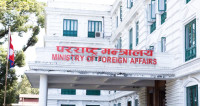National
Government, recruiting agencies differ on possible modality for labour migration to Japan
While the negotiations for sending Nepali workers to Japan are still at the preliminary stage, recruiting agencies have started claiming that the labour migration to Japan will happen via them.
Chandan Kumar Mandal
While the negotiations for sending Nepali workers to Japan are still at the preliminary stage, recruiting agencies have started claiming that the labour migration to Japan will happen via them.
The Nepal Association of Foreign Employment Agencies (NAFEA)—the umbrella organisation of recruiting agencies engaged in hiring of Nepali migrant workers for various countries—looks convinced that they will “get the business” of supplying workers to Japan.
Issuing a statement on Friday evening, NAFEA said the labour migration to Japan—which recently decided to open its market for Nepali workers—would sooner or later take place via recruiting agencies only.
The Nepal government has no other option than sending Nepali workers via recruiting agencies, said Rohan Gurung, president of NAFEA. “There is no alternative to conducting the process with licensed recruiting agencies,” Gurung told the Post.
He also claimed that the Japanese government had already refused Nepal’s proposal of sending workers via the Government-to-Government (G2G) modality.
Labour ministry officials, however, refuted the recruiting agencies’ claim as incorrect.
Ram Prasad Ghimire, joint secretary at the Labour, Employment and Social Security Ministry, told the Post that no decision has been taken yet on the modality of sending Nepali workers to Japan.
“As Japan is the new labour destination, we have to devise completely new mechanisms and modality before we start sending our workers to Japan,” said Ghimire, who is also chief of labour relations and the social security division under the Labour Ministry. “No modality of sending Nepali workers is fixed yet. How can they do so? This is wrong.”
In December last year, Japan unveiled a new labour policy, opening up its labour market to labour source countries, including Nepal. Under the new policy, deserving Nepali workers would get job opportunities under the blue-collar visas.
A high-level Japanese delegation had visited Nepal last month to discuss the prospect of migration of Nepali workers. During the meeting, both sides had agreed to come up with new labour mechanisms to facilitate Nepali workers’ migration to Japan.
According to Ghimire, who led the Nepali delegation during the meeting, Nepal raised its concerns strongly against the presence of any intermediary that could lead to malpractices and fraudulent incidents while sending Nepali workers to Japan.
“We communicated our concerns about intermediary agencies to them. They responded positively and also sought our suggestion on preventing ill-practices,” Ghimire added.
The Labour Ministry has already written back on measures to curtail misconduct that might take place while sending workers to Japan. Since the beginning of negotiations, the government side has pressed for adopting G2G modality for labour migration to Japan—similar to South Korea which looks comparatively well-managed than labour migration to other countries.
“The Japanese side has also said that they would look into the possibilities of adopting the G2G modality of their policies and regulations allow them,” said Ghimire.
“It, however, doesn’t mean private sectors cannot join right away. But it’s not decided yet.”
As per Japan’s plan, nearly 345,000 foreign workers will be allowed to work across 14 industrial sectors that include nursing care, janitorial work, manufacturing, the hotel industry, agriculture and fishing, as well as food processing and food services, over the first five years.
These workers will be hired from China, Indonesia, Mongolia, Myanmar, Nepal, Thailand, the Philippines and Vietnam.
The NAFEA president also claimed that the Japanese government’s decision of hiring foreign workers has no policy of implementing G2G.
“They don’t have any policy of G2G modality as such in their decision of hiring foreign labour forces. They have refused the proposal of Nepali government as well,” added Gurung.




 9.37°C Kathmandu
9.37°C Kathmandu















